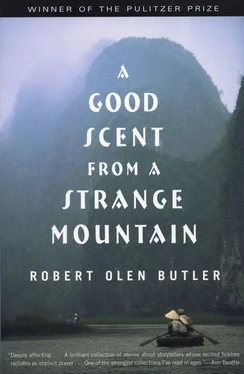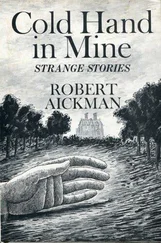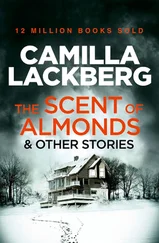He turned to me at once and said, “This is a fine airport. The best I have seen.”
The man’s voice was strong, and this reassured me. I liked his appreciation of the airport, which I, too, admired, so I said to Mr. Hu’o’ng, “Is he a little frail, physically?”
“Yes,” said Mr. Hu’o’ng, happy, I suppose, to have words put in his mouth sufficient to answer my blunt question. I did not like this cousin Hu’o’ng. But I was compelled to ask, “Will you be coming to Lake Charles to join us?”
“No. I must decline your gracious invitation. I return by a flight later this day.”
I was blunt again. “You came all this way never to leave the airport? Just to return at once?”
Mr. Hu’o’ng shrugged. “It is my pleasure to make sure our beloved uncle arrives safely. My father said that if you should wish to discuss Uncle Chinh’s permanent home after perhaps a week or so, he will await your call.”
I didn’t know the details of ail that, except that I was prepared for my wife’s sake and the sake of our country’s family tradition to make him part of our household. So I just nodded and took Mr. Chinh by the arm and said a brief good-bye to Mr. Hu’o’ng, and the old man and I started off for the baggage check.
Mr. Chinh was enchanted with the airport, gawking about as we moved, and his interest was so intent and his pleasure so evident from the little clucks and nods he made that I did not try to speak with him. Twice he asked me a question, once about where they would take the luggage, answered by our arrival at the carousel, which caused him to laugh loud when the bell rang and the silver metal track began to run. Mr. Chinh stood at the opening and he watched each bag emerging through the plastic flaps as closely as a customs inspector. The second question was if I had a car. And when I said yes, he seemed very pleased, lifting his cane before him and tapping it down hard. “Good,” he said. “Don’t tell me what kind. I will see for myself”.
But in the parking garage, he was baffled. He circled the car and touched it gently with the rubber tip of his cane, touched it several places, on a taillight, a hubcap, the front bumper, the name on the grill. “I don’t know this car,” he said. “I don’t know it at all.”
“It’s an Acura,” I said.
He shook the name off as if a mosquito had just buzzed his head. “I thought you would own a French car. A Citroën, I had predicted. A 15CV saloon.”
“No, Mr. Chinh. It’s an Acura. It’s a very good car,” and I stopped myself from telling him it was from Japan.
Mr. Chinh lifted his shoulders and let them drop heavily, as if he was greatly disappointed and perhaps even a little scornful. I put his bags in the trunk and opened the door for him and we made it out of the airport and back onto the two-lane highway before any more words were spoken. I was holding my eyes on the road, trying to think of small talk, something I’m not very good at, when Mr. Chinh finally said, “The inside is very nice.”
I didn’t understand. I glanced over at him and he was running his hand along the dashboard and I realized that he’d been thinking about the car all this time. “Good,” I said. “I’m glad you like it.”
“Not as nice as many others,” he said. “But nice.”
There’s no car interior short of a Rolls that is nicer than my Acura, but I nodded at the old man and I told myself that there was no need to debate with him or entertain him but just to be cordial with him. Let him carry the conversation, if he wished one. But the trip looked very long ahead of me. We hadn’t even gotten out into the country of stump grinders and fruit stands. It was still franchised fast food and clusters of gas stations and mini-malls and car dealerships. There were many miles to go.
Then up ahead I saw the work of a clever man, a car dealer who had dangled a big luxury car from the top of what looked like a seventy-foot crane. I said to Mr. Chinh, “There’s something the Citroëns don’t do,” and I motioned the man’s attention to the car in the sky. He bent down and angled his head up to look and his mouth gaped open. He said nothing but quickly shifted to the side window as we passed the car dealership and then he turned around to watch out the back window until the car on the crane was out of sight.
I expected Mr. Chinh to remark on this. Perhaps how no one would ever do such a thing to a French car. There would be no need. Something like that. But he said nothing, and after a time, I decided to appreciate the silence. I just concentrated on covering these miles before the old man would be reunited with the granddaughter he loved. I found that I myself was no longer comfortable with the old ways. Like the extended family. Like other things, too. The Vietnamese indirectness, for instance. The superstition. I was a good American now, and though I wished I could do more for this old man next to me, at least for my wife’s sake, it was not an unpleasant thought that I had finally left Vietnam behind.
And I’d left behind more than the customs. I don’t suppose that struck me as I was driving home from the airport. But it is clear to me now. I grew up, as did my wife, in V  ng Tàu. Both our families were pretty well off and we lived the year around in this seaside resort on the South China Sea. The French had called it Cap St. Jacques. The sand was white and the sea was the color of jade. But I say these things not from any vivid recollection, but from a thought in my head, as real only as lines from a travel brochure. I’d left behind me the city on the coast and the sea as well.
ng Tàu. Both our families were pretty well off and we lived the year around in this seaside resort on the South China Sea. The French had called it Cap St. Jacques. The sand was white and the sea was the color of jade. But I say these things not from any vivid recollection, but from a thought in my head, as real only as lines from a travel brochure. I’d left behind me the city on the coast and the sea as well.
But you must understand that ultimately this doesn’t have anything to do with being a refugee in the United States. When I got to the two rivers again, Old and Lost, I could recognize the look of them, like a lake, but it was only my mind working.
Perhaps that is a bad example. What are those two rivers to me? I mention them now only to delay speaking of the rest of my ride with Mr. Chinh. When we crossed the rivers, I suppose I was reminded of him somehow. Probably because of the earlier thoughts of the rivers as an omen. But now I tried once more to think of small talk. I saw a large curl of rubber on the shoulder of the road and then another a little later on and I said to Mr. Chinh, “Those are retreads from trucks. In Vietnam some enterprising man would have already collected those to make some use of them. Here no one cares.”
The old man did not speak, but after a few moments I sensed something beside me and I glanced and found him staring at me. “Do we have far to go?” he asked.
“Perhaps an hour and a half,” I said.
“May I roll down the window?”
“Of course,” I said. I turned off the air conditioning and as he made faint grabbing motions at the door, I pressed the power button and lowered his window. Mr. Chinh turned his face to me with eyes slightly widened in what looked to me like alarm. “They’re power windows,” I said. “No handle.”
His face did not change. I thought to explain further, but before I could, he turned to the window and leaned slightly forward so that the wind rushed into his face, and his hair — still more black than gray — rose and danced and he was just a little bit scary to me for some reason. So I concentrated again on the road and I was happy to let him stay silent, watching the Texas highway, and this was a terrible mistake.
If I’d forced him into conversation earlier, I would’ve had more time to prepare for our arrival in Lake Charles. Not that I could have done much, though. As it was, we were only fifteen minutes or so from home. We’d already crossed the Sabine River into Louisiana and I’d pointed it out to Mr. Chinh, the first words spoken in the car for an hour. Even that didn’t start the conversation. Some time later the wandering of his own mind finally made him speak. He said, “The air feels good here. It’s good when you can feel it on your face as you drive.”
Читать дальше

 ng Tàu. Both our families were pretty well off and we lived the year around in this seaside resort on the South China Sea. The French had called it Cap St. Jacques. The sand was white and the sea was the color of jade. But I say these things not from any vivid recollection, but from a thought in my head, as real only as lines from a travel brochure. I’d left behind me the city on the coast and the sea as well.
ng Tàu. Both our families were pretty well off and we lived the year around in this seaside resort on the South China Sea. The French had called it Cap St. Jacques. The sand was white and the sea was the color of jade. But I say these things not from any vivid recollection, but from a thought in my head, as real only as lines from a travel brochure. I’d left behind me the city on the coast and the sea as well.










